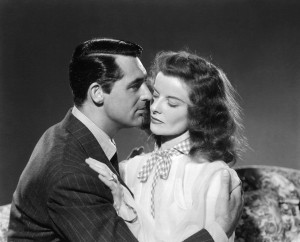The Philadelphia Story (1940)
I was originally intending on watching an Orson Welles’ movie before noticing a consistent trend in my previous movies; all three were severely dramatic, angry or even violent films. Thus, I thought it necessary to watch a film with a lighter tone, so I opted for a romantic comedy. Plus, it stars Katherine Hepburn (picked by American Film Institute as Hollywood’s top female legend).
In terms of favorite genres, romantic comedies rank relatively low on my scale. Even the “best” tend to feel staged, making it harder for the barrier between the actors and the audience to be broken and forgotten about. I still haven’t found a romantic comedy that completely connects, but many have come close (i.e. this movie). The Philadelphia Story follows a wealthy socialite played superbly by Hepburn as her wedding plans are interrupted by her ex-husband and a tabloid writing who falls in love with her. Thus, a sort of love square develops where they don’t really fight for her attention, but instead, the movie focuses on the socialite’s attempts to figure out who she wants.
Hepburn’s character keeps getting referenced to a statue or a goddess in the film, and interestingly enough, it is viewed by all in a negative context. Generally, our current culture likes to highlight that our goal as an individual is to flatten out our errors or mistakes to achieve an image of perfection. However, even though Hepburn’s character acts like she is relatively flawless, this unattainability disconnects her from others. In the end, it is allowing herself to express the full range of emotions that is seen as the most desirable.
As hinted in the other blogs, I’m always interested in the historical context in which a film was made. During the 30’s to early 50’s, the Motion Picture Production Code, which limited what could be shown to the American public, was under the Breen era. Thus, extramarital affairs could not be shown in film. To still include the concept of romance in films, the genre “comedy of remarriage” became popular. It had main characters divorce, flirt with others in attempts to find new love and then ultimately end back together.
And yes, this is how The Philadelphia Story is formatted. This resolution is definitely the thorn in an otherwise strong movie. I can understand why, but it is still incredibly rushed and really doesn’t fit with the tone or interactions introduced earlier. Wouldn’t have it been better to just have Hepburn realize she was confusing love with a desire to feel more vulnerable and doesn’t marry anyone? She even says in the end that she is most glad she finally feels “human, not filled with bronze”. On the other hand, I could understand how that could be a relatively lackluster pay-off for a movie, especially a romantic comedy.
Plus, aren’t the jobs of romantic comedies for you to fall into the illusion of true love overcoming any and all obstacles?
If so, this movie definitely succeeds in its ambitions.



